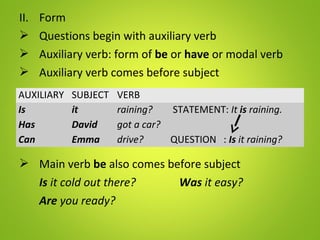yes no and wh questions
- 2. Yes/no questions I. Use ï One that we can answer with yes or no ï Are you ready? ~ Yes, nearly. No, not quite. Has anyone seen my bag? ~ Yes, itâs on the chair./ No, I donât think so. ï These questions are asking for information (Matthew wants to know if Vicky is ready or not.)
- 3. ïOther uses (when Matthew says Shall we go then? he is making suggestion, not asking information ïDifferent uses: Making suggestion: Shall we eat out tonight? Requesting: Can/Could you write the address down for me, please? Offering: Can I carry something for you? ~No, its OK, thanks. Inviting: Would you like to come to a party? ~Yes, Iâd love to. Asking permission: May I use your phone? ~Yes, of course.
- 4. II. Form ï Questions begin with auxiliary verb ï Auxiliary verb: form of be or have or modal verb ï Auxiliary verb comes before subject ï Main verb be also comes before subject Is it cold out there? Was it easy? Are you ready? AUXILIARY SUBJECT VERB Is Has Can it David Emma raining? got a car? drive? STATEMENT: It is raining. QUESTION : Is it raining?
- 5. ïIf more than one auxiliary verb, only first one comes before subject Have you been working? Could we have done better? ïForm of do (Present Simple & Past Simple) AUXILIARY SUBJECT VERB Do Does Did the buses Mark you run every day? play golf? like the concert? STATEMENT: They do run every day. QUESTION : Do they run every day?
- 6. ïQuestion cannot begin with ordinary verb (run, play or like) Plays Mark golf? Liked you the concert? ïVerb after subject does not end in âs or âed Does Mark plays golf? Did you liked the concert?
- 7. Wh-questions I. Introduction ï Reporter Kitty Beamish is interviewing some guerilla fighters. Kitty : Why are you fighting? Guerrillas : For our freedom. Kitty : What can you do for the people? Guerrillas : We can help them. Kitty : When will the war be over? Guerrillas : Very soon.
- 8. ïA wh-question begins with a question word. Question words are who, what, which, whose, where, when, why and how. ïWe use a wh-question to ask for information.
- 9. II. Form ï Begin with a question word + an auxiliary verb + the subject ï Auxiliary verb: form of be or have or modal verb (can) QUESTION WORD AUXILIARY SUBJECT VERB What Where When is have can Kitty you we doing ? put the map? travel safely?
- 10. ïVerb be also comes before the subject in questions ïžWhere is Kitty? ïžHow are you? ïžWhat was that noise? ïOnly the first auxiliary verb comes before the subject if there is more than one The guerrillas have been hiding. I should have said something. Where have the guerrillas been hiding? What should I have said?
- 11. ïIn the Present Simple and Past Simple we use a form of do. QUESTION WORD AUXILIARY SUBJECT VERB Where How What do does did people the radio the guerrillas meet? work? say?
- 12. III. Question phrases with what and how What time is your friend arriving? ~ Half past eight. What colour is your toothbrush? ~Yellow. How often do you go out? ~About once a week, usually. How long will the meeting last? ~An hour or so, I expect.












